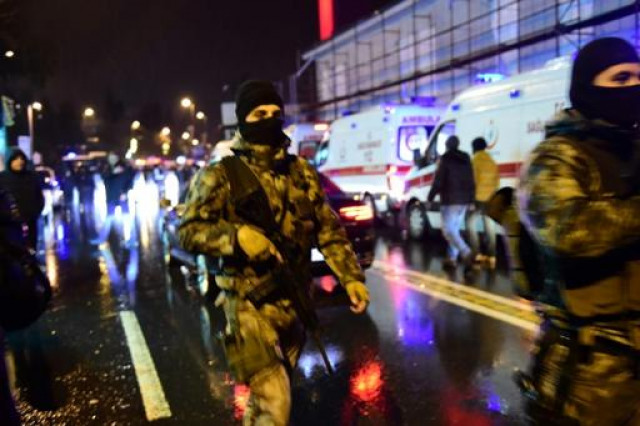A bloody New Year
The year 2016 has been perhaps the most unhappy and violent in Turkish recent history

Turkish special force police officers and ambulances are seen at the site of an armed attack at the Reina nightclub in Istanbul on January 1, 2017. PHOTO: AFP
On the morning of 2nd January Reuters were also reporting that the Islamic State (IS) was claiming the massacre, a claim impossible to verify. There is no causal link between the tragedies half a world apart other than terror — in Brazil the fear that the shooting may be terror-linked, and in Turkey the reality that it was. The fear of terror is universal, touching everybody everywhere.
There were 22 terrorist attacks in Turkey in 2016 leaving at least 360 dead and more than a thousand injured. The country has become bitterly divided politically, ethnically and economically in the years in which President Recep Tayyip Erdogan has been in power. Mehmet Gormez, the most senior Muslim cleric in Turkey, condemned the attack as did world leaders and their foreign secretaries, a condemnation that is part of the post-attack Theatre of the Macabre, a piece of Grand Guignol played out in front of press conferences and in media statements that does nothing to either address or mitigate the underlying causes of terror whatever its nationality or origins.
For Turkey there is little hope of anything other than more of the same in 2017. Indeed for much of Europe and the Middle East the new year looks bleak, though the Russian brokered ceasefire in Syria largely appears to be holding. No such peace in Turkey. Alongside the almost 300 deaths associated with the failed coup there are the twin bombings outside a football stadium in Besiktas that killed 46 mostly police officers; the attacks on the Ataturk airport and another near the Hagia Sophia mosque — the butcher’s bill ever lengthens.
Why? Who? There has been criticism of the polarising rhetoric from conservative clerics and media outlets that have spoken of the ‘sinfulness’ of New Year’s celebrations — the attack may conceivably have been on the national secular character that has become strained under the Erdogan Presidency. Or it could have been the Kurds. Or those protesting against the Turkish engagement in the Syrian civil war. Or it could, as is claimed, have been the Islamic State or one of their innumerable and anonymous proxies. The IS may be on the retreat in terms of the physical territory it holds but as an idea, an ideal, an ideology, it continues to proliferate in dark hearts and blacker minds everywhere, the terrorist equivalent of a virus for which there is no vaccination as yet.
The year 2016 has been perhaps the most unhappy and violent in Turkish recent history. Terrorist attacks aside the insurgency in the southeast of the country shows no sign of resolution. Hopes of joining the European Union faded dramatically in the post-attempted-coup crackdowns; feeding through to a national climate of instability and uncertainty into which any number of groups, agencies, lone individuals and entities are liable to pitch a bomb, a gunman, a suicide bomber. In 2017 President Erdogan is going to seek to expand his already substantial constitutional powers, much to the dismay of the secularists who see an increase in polarities and violence as the state moves ever further to the right. In Brazil the fear of terror led to a swift mislabeling — but there was no mistake in Turkey.
Published in The Express Tribune, January 3rd, 2017.
Like Opinion & Editorial on Facebook, follow @ETOpEd on Twitter to receive all updates on all our daily pieces.














COMMENTS
Comments are moderated and generally will be posted if they are on-topic and not abusive.
For more information, please see our Comments FAQ